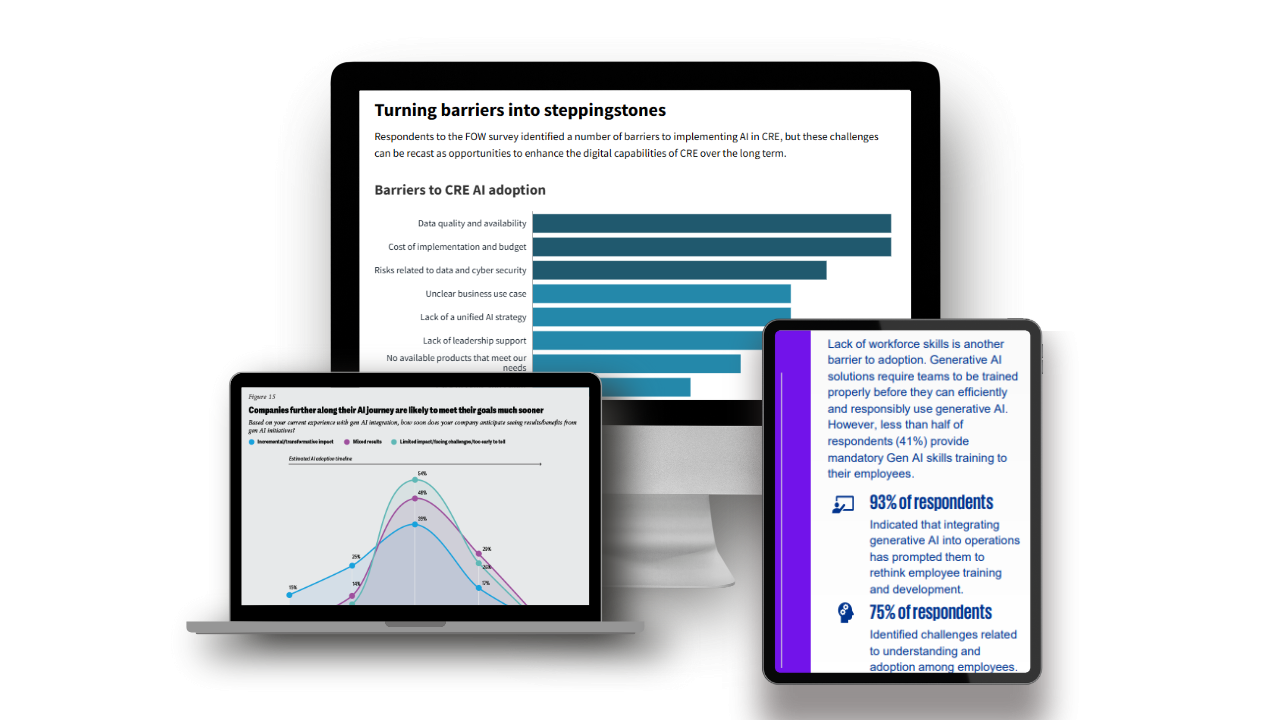AI isn’t just another tech trend—it’s a fundamental shift that’s redefining commercial real estate at every level. From market analysis to asset management, AI is changing how leaders streamline
operations, optimize portfolios, and stay ahead of market trends.
But AI isn’t just transforming real estate—it’s also revolutionizing the way companies themselves function. Leaders must now rethink operations, efficiency, and team management in an AI-powered world. From financial forecasting to lease negotiations, AI is embedding itself into daily workflows—and yet, many CRE leaders feel unprepared, overwhelmed, and unsure how to integrate AI into their strategies.
While leaders don’t need to become AI engineers, they must become AI-literate—which is distinct from AI expertise. AI literacy means understanding how AI works at a fundamental level, recognizing its capabilities and limitations, and knowing how to strategically apply it to business operations.
The challenge? AI is advancing faster than most CRE leaders can keep up, creating a widening knowledge gap between technology and leadership.
The next generation of CRE executives won’t just manage properties and portfolios—they’ll need to lead AI-driven transformations in both real estate strategy and internal business operations. This includes everything from financial forecasting and lease negotiations to workplace automation and workforce management. AI is streamlining everything from tenant engagement to predictive analytics, meaning that leaders who understand how to harness AI’s potential will build more agile, efficient, and forward-thinking organizations.
AI adoption in real estate is accelerating rapidly, with integrations across nearly all areas of the business, including predictive analytics and market research, lease abstraction, smart building management, and transaction automation. Here are some stats on current and anticipated rates of AI adoption across the industry:
-
90% of CRE organizations plan to increase investment in AI-driven technology within the next five years. (JLL, 2024)
-
97% of CRE executives report being committed to implementing AI-enabled solutions, with 40% already in early-stage implementation. (Deloitte, 2024)
-
72% of real estate owners and investors have deployed or plan to deploy AI solutions in their organizations. (Deloitte, 2024)
Despite AI’s increasing relevance, many CRE leaders report:
-
Only 33% of senior CRE managers say they have an AI strategy in place, despite 70% of higher-level business leaders claiming one.(JLL, 2024)
-
Less than half of CRE firms have offered formal AI training to employees, making workforce AI literacy a major barrier to adoption.
-
AI-related anxiety persists—71% of employees worry about AI’s impact, citing fears of job displacement and ethical concerns. (EY, 2023)
-
Data challenges remain a top obstacle—only 14% of real estate firms feel they have ‘AI-ready’ structured data to support AI implementation. (Deloitte, 2024)
The bottom line? The gap between AI adoption and AI literacy is growing, and companies that fail to close this gap will find themselves at a serious competitive disadvantage. AI-driven tools are transforming not just real estate assets but entire business operations, and yet most CRE firms lack structured training to help leaders and teams fully leverage these innovations.
This is not just an individual leadership challenge—it’s an organizational imperative. Firms that fail to invest in AI literacy will struggle to compete, not just because their leaders are unprepared, but because their entire workforce will lag behind in understanding and integrating AI-driven efficiencies. From asset management to deal structuring, AI-literate teams will drive growth, while others risk stagnation.
If you're feeling overwhelmed by AI, you're not alone. The pace of change is rapid, and many leaders struggle to find the time to keep up. But AI literacy isn’t about learning to code or mastering complex algorithms—it’s about knowing how to make better business decisions in an AI-driven world.
Here are four key steps to start integrating AI literacy into your leadership approach today:
Learn the Fundamentals
Develop a baseline understanding of AI concepts, terminology, and applications in real estate.
These 5 must-read reports on AI in CRE are a great place to start.
Evaluate AI Opportunities in Your Business
Identify 1-2 areas where AI can improve efficiency, decision-making, or customer experience in your organization.
Foster a Culture of AI Learning
Ensure regular training sessions, knowledge-sharing discussions, and team-wide engagement with AI developments. Encouraging continuous learning will help leaders and teams stay ahead.
Stay Informed Without Getting Overwhelmed
Follow key industry publications, AI newsletters, and thought leaders who break down complex AI trends into actionable insights.
The industry is at a critical turning point—those who invest in AI literacy now will position themselves for long-term success, while those who ignore it risk losing market share to AI-savvy competitors. This is no longer just about innovation—it’s about survival in an evolving industry. The urgency to equip leaders and their organizations with the right skills, resources, and frameworks has never been greater.



